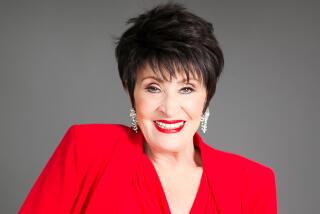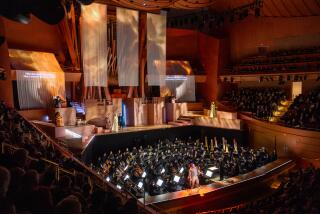Rita Hunter; Versatile English Soprano Noted for Performing in Wagner’s ‘Ring’
- Share via
Rita Hunter, the quintessential Brunnhilde of Wagner’s “Ring” cycle, whose heroic yet lyrical soprano resonated from international opera stages, recital halls and recording studios for nearly four decades, has died. She was 67.
Hunter, a native of Wallasey, England, died Sunday at her home in Sydney, Australia, according to her daughter, Mairwyn Hunter-Thomas.
London’s Financial Times called the diva “the vocal embodiment of English National Opera’s ‘Ring’. . . . It’s what she will always be remembered for.”
In 1970, Hunter was well into her career when she made her first major impact on the international opera scene, singing Brunnhilde in “Die Walkure”--one of the four operas in “The Ring of the Nibelung”--with Sadler’s Wells, the predecessor of English National Opera. Three years later, she sang the role in the company’s first complete “Ring” cycle, and she would repeat it memorably in English- and German-language recordings and on stages in Munich, New York, Seattle and Sydney.
In 1975, Hunter performed the title role of Bellini’s “Norma” with the San Francisco Opera and then repeated that triumphal interpretation with New York’s Metropolitan Opera on her way back to London to sing Brunnhilde again.
Her remarkably flexible voice never restricted her to Wagner, in whose “The Flying Dutchman” she also performed, but enabled her to sing leading roles as well in Verdi’s “Aida,” “Il Trovatore,” “A Masked Ball,” “Don Carlos,” “Nabucco” and “Macbeth,” Mascagni’s “Cavalleria Rusticana,” Mozart’s “Idomeneo,” Puccini’s “Turandot” and Strauss’ extremely challenging “Elektra.”
“One of the qualities that makes Hunter unique, and such a compelling artist in concert settings and on record,” said Scotland on Sunday in 1994, “is her ability to nuance a performance by sheer vocalism and without recourse to histrionics. . . . Hunter has the ability to reinvent arias, invest them with enough detail to turn them into mini-dramas of their own.”
Hunter’s physical size, in an era that embraced ever slimmer performers, and the fact that she sang roles primarily in English, kept her from reaching the zenith of international opera stardom. Nevertheless, her vocal talent made her a popular recital performer throughout Europe, the United States, Australia and New Zealand.
“It’s bloody boring when I don’t work,” the blunt-spoken Hunter told The Times in 1988 when she was in Southern California to sing the role of Tove in Schoenberg’s “Gurrelieder” with the Pacific Symphony at the Orange County Performing Arts Center.
“Other singers stay in shape by vocalizing,” she said. “I find the most effective way to stay in condition is to sing two performances a week. I never find my voice in the studio--I find it on stage.”
Hunter, who also lectured at UCLA, studied singing with Edwin Francis in Liverpool and Redvers Llewellyn in London.
Rita Nellie Hunter was made a Commander of the British Empire in 1980 by Queen Elizabeth II, and in 1986 published her autobiography, “Wait Till the Sun Shines, Nellie.”
She married tenor John Darnley Thomas in 1960, and after his death in 1994, took over management and principal teaching duties at his Singing Academy in Sydney. Hunter is survived by her daughter.
More to Read
The biggest entertainment stories
Get our big stories about Hollywood, film, television, music, arts, culture and more right in your inbox as soon as they publish.
You may occasionally receive promotional content from the Los Angeles Times.










